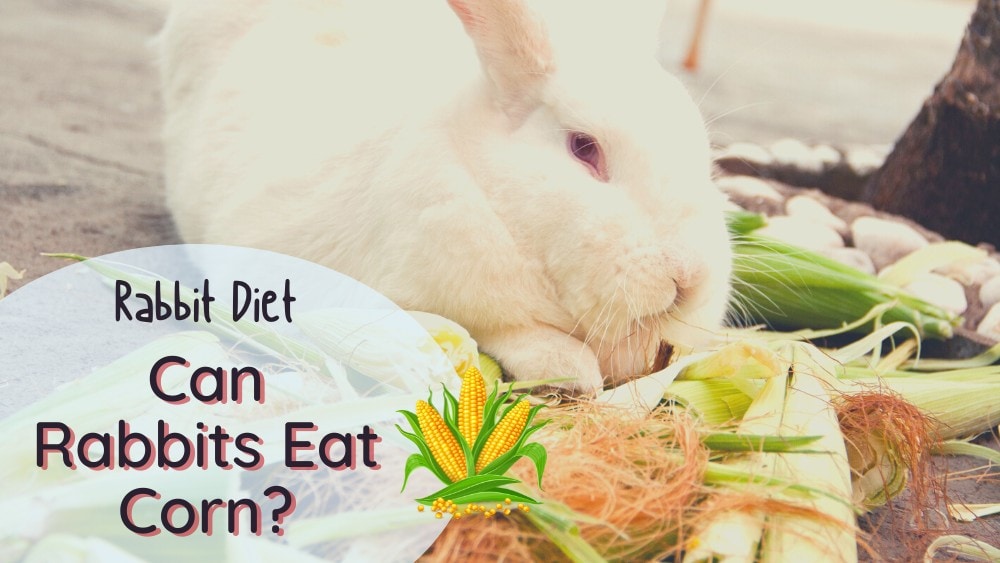We all know sweetcorn is a healthy vegetable in our diets, and as a rabbit owner, you may want to share this nutritious vegetable or cereal with your pet rabbit. Certain foods, like kale and apple, are as good for rabbits as they are for humans. But is corn one of them?
This comprehensive guide to the question, “Can rabbits eat corn?” covers all the necessary information you need to know before you offer corn to your beloved pet rabbit. We will discuss:
- The nutritional value of corn
- Parts of the corn plant you can safely feed your bunny
- Risks associated with feeding corn to rabbits
- Alternatives to corn in a rabbit’s diet
So let’s dive right in and see if sharing this tasty vegetable with your pet is safe!
Can Rabbits Eat Corn?
Although it’s not toxic, corn is not recommended for rabbits in any form. It does not provide them with useful nutrients, and is high in sugar and starch content that poses several health risks for a rabbit’s health, including obesity and gastrointestinal problems like gastrointestinal stasis and cecal dysbiosis. Corn kernels can also present a choking hazard to bunnies.
What is the Nutritional Value of Corn?
Corn is a vegetable that contains numerous nutrients that can be especially beneficial for humans.
Here are some of the Nutritional Benefits of 100 grams of Sweet Yellow Corn:
| Protein | 3.27 g |
| Fat | 1.35 g |
| Carbs | 18.70g |
| Fiber | 2.00 g |
| Sugars | 6.26 g |
Corn also contains several vitamins like vitamins A, B, D, and K. It has minerals like calcium, iron, magnesium, phosphorous, and sodium.
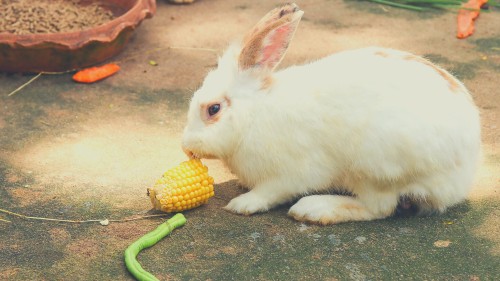
However, the high carbohydrate and low fiber content of corn makes it less than ideal for a rabbit’s digestive tract. While your bunny might like the taste of corn because of their sweet tooth, it isn’t a good option for pet rabbits.
Which Parts of the Corn Plant Can Rabbits Eat?
Rabbits can’t eat corn, including sweetcorn, corn kernels, or corn on the cob, because they find them difficult to digest. But how about the corn plant itself?
The good news is that there are some parts of the corn plant that you can share with your rabbit. Here’s a quick guide on the parts you may safely feed your bunny.
Can rabbits eat corn stalks?
Yes, rabbits may eat the corn stalk, as it doesn’t harm them and they usually enjoy gnawing on it!
However, you should note that most commercial corn plants are sprayed with pesticides and insecticides, which may harm your rabbit. Washing the corn stalk doesn’t help much, as traces of these chemicals may still be left even after washing.
Therefore, it’s best for you to avoid feeding corn stalks to your rabbit unless you are sure it has not been sprayed with chemicals.
Can rabbits eat corn leaves?
Rabbits may safely eat corn leaves. But, again, make sure it hasn’t been sprayed with insecticides or pesticides. Also, wash the leaves thoroughly to get rid of dirt before serving them to your rabbit.
Can rabbits eat corn husks?
Yes, rabbits may eat corn husks. Again, make sure the husks are free from harmful chemicals. Remove all the silky hairs on the corn husk before serving to your rabbit, as these hairs might choke your bunny. If you are going to feed your rabbit corn husks, wash them properly to get rid of dirt.
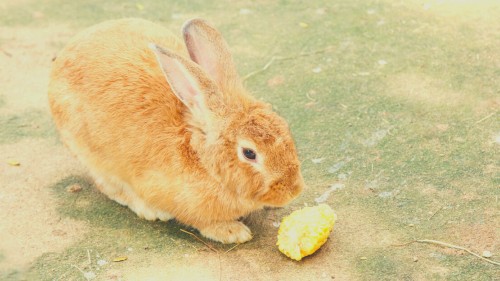
Risks Associated with Feeding Corn to Rabbits
Numerous health issues may arise if a rabbit eats corn due to its high sugar and starch content. It is essential to provide a fiber-rich diet to keep your rabbit’s intestinal tract healthy.
The ideal rabbit diet should be focused on fibrous hay, and low in carbohydrates and fat, which are present in corn in unhealthy quantities for bunnies. Hence, keeping corn out of your pet rabbit’s food dish is recommended.
Here are some risks associated with adding corn to your rabbit’s diet.
Obesity
The high sugar content in corn makes it a wrong choice of vegetable for rabbits, and including it in your rabbit’s diet can cause it to gain weight. Obesity poses several health risks for bunnies and could result in diabetes, arthritis, kidney problems, and cardiovascular problems.
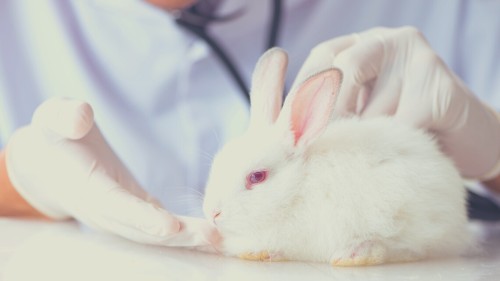
Gastrointestinal stasis
Gastrointestinal (GI) stasis, also known as hypomotility or ileus, is a severe condition in which the normal movement of a rabbit’s digestive system slows down or stops altogether. A sudden change in a rabbit’s diet, as is the case when you suddenly include corn in your rabbit’s food dish, may result in GI stasis. Corn kernels and corn on cob can also block paths of digestion, this can also result in GI stasis.
If your rabbit has eaten corn, watch out for the symptoms of GI stasis. This includes loss of appetite which subsequently leads to reduced or absent fecal production, bloating, and signs of pain like teeth grinding. If left untreated, GI stasis can result in severe pain and death.
To prevent GI stasis, avoiding sudden changes to your rabbit’s diet is important. Instead, provide your bunny with a fiber-rich diet low in carbs, sugars, and fat, as these are more suited to keeping a rabbit’s gut healthy.
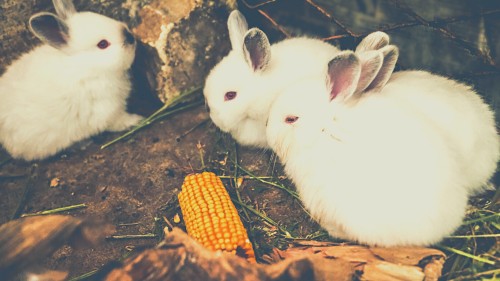
Cecal dysbiosis
Cecal dysbiosis is a condition that causes rabbits to produce abnormal cecotropes. Cecotropes are a type of rabbit poop rich in nutrients and can be eaten. They are naturally produced by rabbits. However, in cases of cecal dysbiosis, abnormal cecotropes are produced. These are puddle-like, smelly, and usually go uneaten.
Cecal dysbiosis occurs when there is an imbalance in a rabbit’s gut health, such as high sugar in the diet. That is when harmful microorganisms in a rabbit’s digestive system outnumber the beneficial ones ordinarily present in it. For example, a diet high in starch and sugars upsets the bacterial balance in the cecum, the part where fibers are broken down, causing harmful bacteria to grow, resulting in cecal dysbiosis.
If a rabbit has cecal dysbiosis, putting them on a high-fiber and low-sugar diet will help restore the bacterial balance. Consult your veterinarian if you observe your rabbit producing abnormal cecotropes.
Mycotoxicosis
This condition could arise if a rabbit eats contaminated corn or feed. Mycotoxins are a type of poison that some species of fungus produce, as a by-product of their digestive processes. They cause a toxic response when humans or animals ingest them. Fumonisins are an example of mycotoxins that contaminate grains like corn, rice, or barley. However, corn is the primary source of fumonisins.
A rabbit eating corn contaminated with molds may develop mycotoxicosis, with symptoms including reduced appetite, abdominal pain, weight loss, liver failure, and kidney failure. Consult your veterinarian immediately if you notice any abnormal symptoms after feeding your rabbit corn.
Alternatives to Corn in a Rabbit’s Diet
You can safely feed your bunny a wide range of vegetables and fruits. Here are some alternatives to corn in a rabbit’s diet:
- Apples
- Bananas
- Blueberries
- Broccoli
- Grapes
- Green beans
- Strawberries
- Watermelon
- Peaches
- Bell peppers
- Kale
- Cabbage
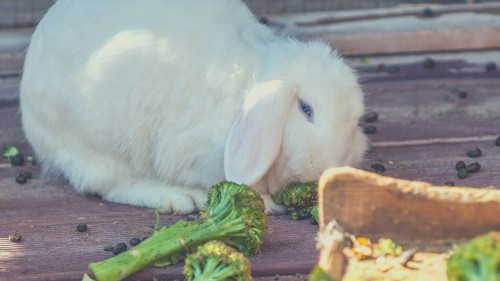
Before feeding your rabbit any new fruit or vegetable, it is important to do your research to learn how to prepare them and how much to feed your bunny.
FAQs
Can bunnies eat canned corn?
Rabbits shouldn’t be fed canned corn, as it is as bad as fresh corn for rabbits. Canned corn often contains additional sugar, which could cause your bunny to become obese. Also, canned corn and other processed foods contain preservatives that may upset your rabbit’s digestive system, so avoiding them is best.
Can rabbits eat cooked corn?
No, rabbits cannot eat cooked corn or cooked food in general. A rabbit’s digestive tract is designed to obtain nutrients from raw foods because they are herbivores. They are not able to get nutrients from cooked foods or vegetables.
Should rabbits eat baby sweetcorn?
Baby sweetcorn is unsafe for rabbits due to its high sugar content. Adding it to your rabbit’s diet could result in several gastrointestinal problems or cause it to gain weight excessively.
Can rabbits eat popcorn?
No, rabbits shouldn’t eat popcorn as it’s difficult for rabbits to digest. It may constitute a choking hazard: sweetcorn kernels mixed in with the popcorn can get stuck in a rabbit’s narrow windpipe.
Popcorn also contains additional sugar, salt, and butter, which may result in several health issues for your pet rabbit, including obesity and gastrointestinal issues like GI stasis and diarrhea.
Can baby rabbits eat corn?
Young or small rabbits should not be fed corn as their digestive system still adapts to the adult diet of grass hay and pellets. Feeding corn to a baby or juvenile rabbit upsets their delicate digestive tract and causes them to fall sick.
Can rabbits use corn cobs as chew toys?
Corn cobs should not be used as rabbit chew toys. Cobs lack the abrasive texture required to help rabbits file down their incisors. Cobs could break in the mouth, causing the rabbit to swallow pieces intentionally or accidentally. These indigestible pieces could get stuck in the rabbit’s digestive tract, resulting in gastrointestinal stasis or an impaction.
Bottom Line: Can Rabbits Eat Sweetcorn?
Corn is not a healthy addition to a rabbit’s diet, as it holds no nutritional value for them. Letting your rabbit eat corn affects its health and may result in obesity, mycotoxicosis, and gastrointestinal issues like GI stasis and cecal dysbiosis. Consult your veterinarian immediately if your rabbit shows unhealthy symptoms after eating corn.
If you have enjoyed this article, share it with your fellow rabbit owners, and if you have further questions about your rabbit’s diet, leave them in the comments section below.


